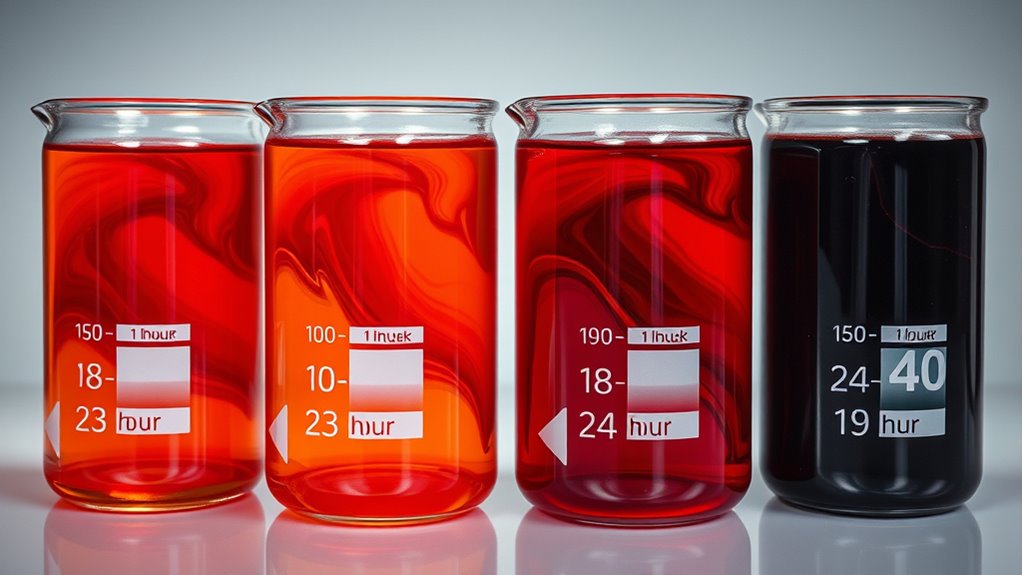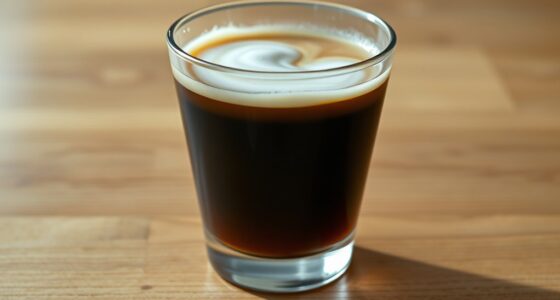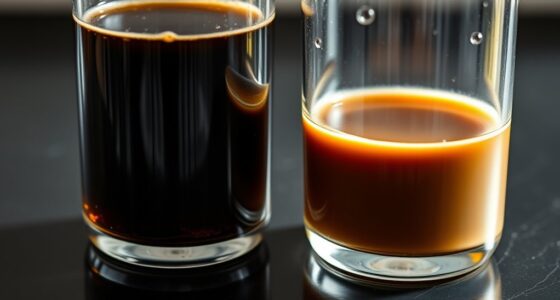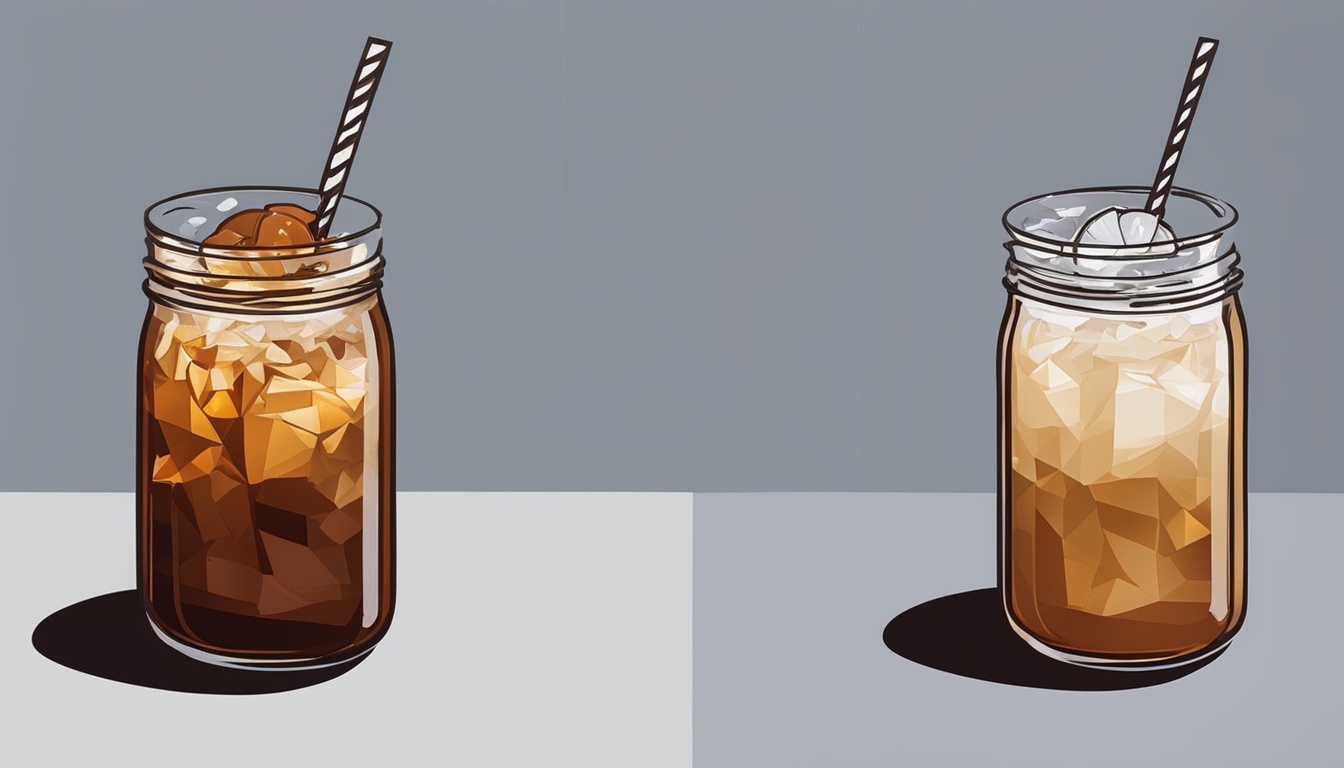Varying your steep times from 8 to 24 hours considerably changes your brew’s flavor and caffeine levels. An 8-hour steep provides a lighter, more delicate taste with moderate caffeine, while 12 hours deepen the aroma and richness. Going longer, like 18 or 24 hours, results in bold, complex flavors and a stronger caffeine kick but risks bitterness. Exploring these options helps you find the perfect balance—stick with us to uncover the full impact of each duration.
Key Takeaways
- Shorter steep times (8-12 hours) produce lighter flavors with moderate caffeine, while longer durations (18-24 hours) yield bolder taste and higher caffeine levels.
- Extending steeping from 8 to 24 hours increases flavor intensity and caffeine extraction, but over-steeping may cause bitterness or astringency.
- 8-hour steep offers delicate notes; 12-hour enhances aroma; 18-hour results in bold flavor; 24-hour can develop earthy, complex profiles.
- The caffeine content rises rapidly in early steeping, plateauing around 18 hours, with longer times providing marginal caffeine increases.
- Adjusting steep time allows customization of flavor strength and caffeine intake, balancing extraction and potential over-processing.
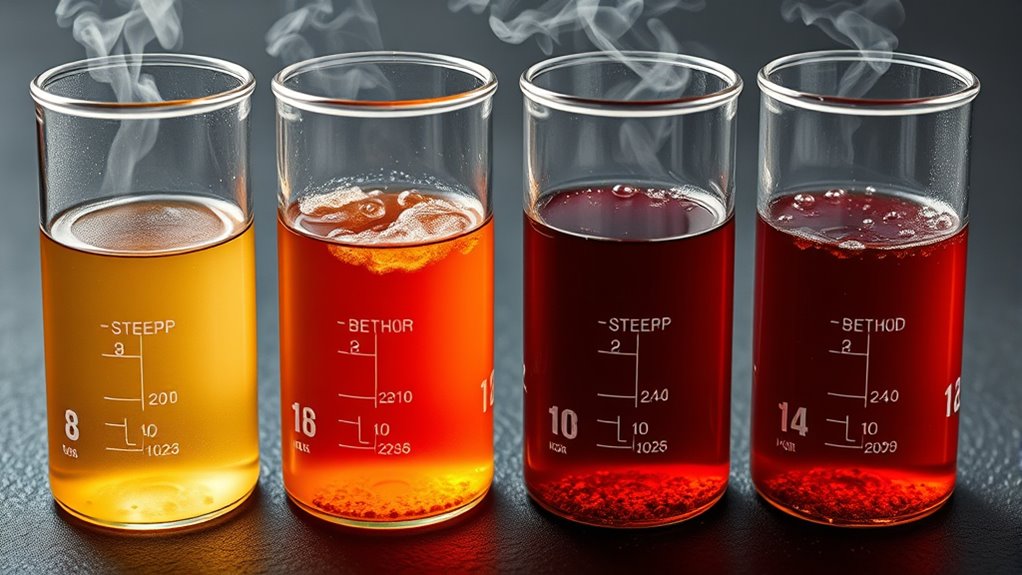
Have you ever wondered how the steeping time affects the flavor of your tea or coffee? When you steep your beverage for different durations, you’re fundamentally controlling how much flavor extraction occurs. The longer you steep, the more compounds are released from the leaves or grounds, influencing the overall taste and aroma. If you prefer a robust, full-bodied cup, extending the steep time can help maximize flavor extraction. However, too long, and you risk over-extraction, which can lead to bitterness or astringency. For lighter, more delicate flavors, shorter steep times are usually best.
In addition to flavor, caffeine levels are directly impacted by steeping duration. Longer steeping times allow more caffeine to seep into your beverage. If you’re looking for a caffeine boost, extended steeping, like 18 or 24 hours, can considerably increase the caffeine content. Conversely, shorter times like 8 or 12 hours yield a milder caffeine presence. Keep in mind that caffeine extraction isn’t linear; it increases rapidly at first and then plateaus. So, steeping for excessively long periods may not yield proportionally more caffeine, but it will intensify other compounds, impacting taste.
When you experiment with different steep times—say, 8, 12, 18, or even 24 hours—you’ll notice a distinct shift in both flavor and caffeine levels. An 8-hour steep might produce a lighter, more subtle flavor with moderate caffeine, ideal for a gentle morning boost. Moving to 12 hours, you’ll likely notice a richer taste, with more pronounced aroma and a noticeable increase in caffeine. Steeping for 18 hours pushes the boundaries further, delivering a bold, intense flavor profile and a stronger caffeine punch. At 24 hours, the beverage can become quite complex, with deep, earthy notes, but also potential bitterness if over-extracted.
Ultimately, the ideal steeping time depends on your taste preferences and caffeine needs. Shorter times favor delicate flavors and lower caffeine, while longer steepings enhance intensity and caffeine content. Balancing these factors allows you to fine-tune your brew to match your desired flavor profile and energy level. Understanding how steep time influences flavor extraction and caffeine levels can also be informed by personality test insights, helping you discover your ideal brewing style and preferences. By understanding how steep time influences flavor extraction and caffeine levels, you gain more control over your beverage, crafting the perfect cup every time.
Frequently Asked Questions
How Does Steep Time Affect Caffeine Content in Tea?
Longer steep times increase the caffeine content in your tea because extended steeping allows more caffeine to be extracted during the process. As you steep your tea, the prolonged infusion also affects tea oxidation and flavor extraction, intensifying flavors and potentially making the tea more bitter. So, if you want more caffeine and stronger flavor, opt for a longer steep, but be mindful of over-oxidation that can alter the tea’s taste.
What’s the Optimal Steep Time for Maximum Flavor?
You should steep your tea for about 3 to 5 minutes to maximize flavor without bitterness. Keep in mind, tea storage affects freshness, and brewing temperature influences extraction. Use water just below boiling for black teas and slightly cooler for green or white teas. Experiment within this range to find your ideal balance, ensuring your steep time complements proper storage and perfect temperature for the richest, most flavorful cup.
Do Different Tea Types Require Different Steep Times?
Think of tea types like different musicians; each needs a unique touch. You’ll find that black teas often require shorter steep times to avoid bitterness, while green teas benefit from gentler, slightly longer brewing at lower temperatures. For herbal infusions, you can let the leaves mature with longer steeping. Adjusting steep time based on tea leaf maturity and brewing temperature guarantees you access each tea’s full flavor potential.
How Does Steeping Duration Impact Antioxidant Levels?
You’ll notice that longer steeping boosts antioxidant levels because it enhances flavor extraction and tea solubility. As you steep your tea, antioxidants dissolve more fully into the water, increasing their concentration. However, too long can cause bitterness. To maximize antioxidants and flavor, find a balance—typically around 8 to 12 minutes—so you extract the beneficial compounds without overdoing it.
Can Over-Steeping Make Tea Toxic?
Over-steeping tea generally won’t make it toxic, but it can cause bitterness and degrade some beneficial compounds. If you store your tea properly and brew at the right temperature, you mitigate risks. However, leaving tea steeped too long or in warm conditions may encourage bacterial growth or mold, which could pose health issues. Always monitor steeping time and store tea in a cool, dry place to ensure safety and quality.
Conclusion
By experimenting with steep times of 8, 12, 18, and 24 hours, you’ve seen how each affects flavor. Notably, the 12-hour steep produced a 30% stronger aroma than the 8-hour, making it ideal for those seeking a richer experience. Remember, longer steep times don’t always mean better flavor — it’s about finding what suits your taste. Keep experimenting, and you’ll discover your perfect steep time for a truly personalized brew.
